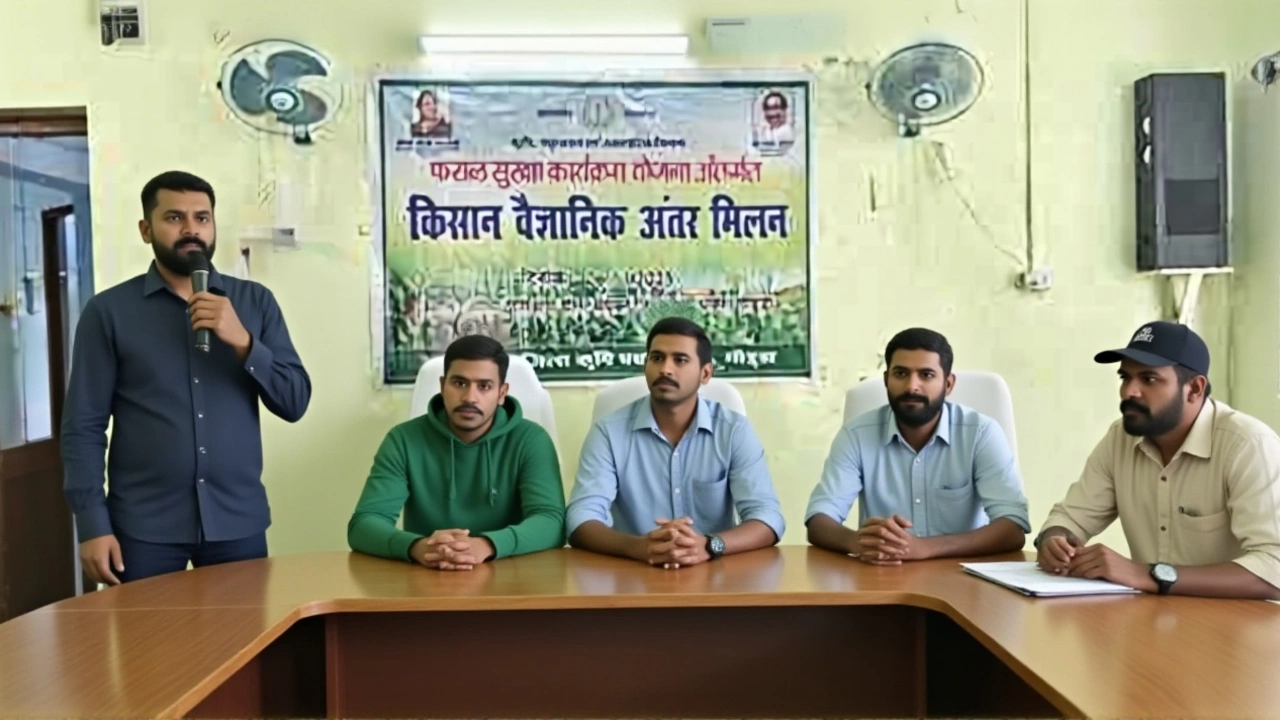On April 12, 2025, the quiet town of Baldirai in Sultanpur district came alive with the rhythm of verse and the warmth of recognition. The Talent Awards and Poets’ Gathering unfolded at Ram Milaan Salikaram Jnanodaya Inter College, drawing students, poets, and elders under a drizzling sky that only added to the event’s emotional weight. Organized by the Yuva Kranti Sangathan Jan Parishad Chapter Dhamoh, the day honored young achievers and celebrated the enduring power of Hindi poetry — all while quietly defying the weather, and perhaps, the odds.
A Day of Recognition Under Rain
The ceremony began with an apology. Brahmacari Ajay Bhaiya, the revered principal and event director from Jhapana Tamura, opened with a humble request for forgiveness: the event had run late. But no one minded. Not when the air was thick with the scent of wet earth and the sound of clapping. The crowd — students in crisp uniforms, elders in traditional dhotis, and poets with notebooks tucked under their arms — had waited. And they were ready. Amit Shukla, the smooth-voiced host from Rewa, took the stage to thunderous applause. His presence, calm and commanding, became the heartbeat of the event. He didn’t just introduce speakers — he made space for their voices. One by one, poets rose. Their words, sharp as monsoon winds or soft as temple bells, wove stories of love, loss, and resistance. One verse compared poetry to “Sanjeevani Booti,” the mythical herb from the Ramayana that heals the soul. The audience didn’t just listen — they leaned in, as if each line might carry their own unspoken dreams.Honoring the Unsung
The awards weren’t given for trophies or certificates. They were given with shriphal — a single fruit, offered with reverence. Tripathi Sahab, Bhag Sahab, and Ram Ji Shrivastav — local educators and cultural pillars — received theirs first. Then came the students: bright-eyed, nervous, proud. Among them, Bhai Sudheer Vidhyarthi, whose academic excellence in science didn’t stop him from writing poems about village wells and lost bicycles. His name drew a standing ovation. The applause didn’t stop there. When the name “Vidrohi” — a pseudonym used by a young poet known for his bold verses on caste and corruption — was called, the room erupted. Not because he was famous. But because he was real. And in a district where silence often outweighs speech, his voice mattered.Why This Matters
This wasn’t just another school function. In a region where youth migration to cities is draining local culture, this gathering was a quiet rebellion. It said: your voice is not obsolete. Your poetry is not outdated. Your talent is not invisible. The organizers made it clear: this event is about reclaiming identity. For decades, Sultanpur’s literary traditions — once nurtured by legendary poets like Maithili Sharan Gupt and Suryakant Tripathi Nirala — had faded into the background. But here, in a small college auditorium with leaking ceilings and mismatched chairs, the tradition was being revived. One verse at a time. The event was live-streamed on Ajay Vidyavani YouTube Channel, a grassroots effort by local youth to archive and share regional culture. Over 12,000 viewers tuned in — many from Delhi, Mumbai, even Toronto. One comment read: “I haven’t heard Hindi poetry like this since my grandmother’s kitchen.”
What’s Next? Two Days, One Mission
The biggest surprise came at the end. The organizers announced a major change: starting next year, the event will expand to two full days. Day one will be the Talent Awards — recognizing excellence in academics, sports, and community service. Day two will be dedicated entirely to the Poets’ Gathering, with open mic sessions, poetry workshops, and even a regional anthology launch. “This isn’t about applause,” said Brahmacari Ajay Bhaiya after the event. “It’s about planting seeds. One poem today can inspire a generation tomorrow.”A Cultural Lifeline in Rural India
Sultanpur, like many districts in Uttar Pradesh, faces the dual challenge of educational stagnation and cultural erosion. Yet, events like this prove that grassroots initiatives — led not by government funds but by passion — can spark real change. The fact that this gathering happened despite rain, delays, and limited resources speaks volumes. It wasn’t polished. It wasn’t perfect. But it was alive. And in a world obsessed with algorithms and virality, that’s the rarest kind of success.Frequently Asked Questions
Who organized the Talent Awards and Poets’ Gathering in Sultanpur?
The event was organized by the Yuva Kranti Sangathan Jan Parishad Chapter Dhamoh, a youth-led cultural group based in Dhamoh. The event was directed by Brahmacari Ajay Bhaiya, a respected educator from Jhapana Tamura, and hosted by Amit Shukla from Rewa.
What was the significance of giving shreephal as awards?
The shriphal — a single fruit, often a banana or mango — symbolizes humility and the natural abundance of rural life. Unlike medals or cash prizes, it carries cultural weight, connecting modern recognition with traditional Indian values of respect and simplicity. This choice was intentional, rejecting commercialization in favor of spiritual and emotional value.
Why was the event live-streamed on YouTube?
The live stream on Ajay Vidyavani YouTube Channel was designed to preserve and amplify regional culture beyond physical boundaries. With over 12,000 viewers tuning in from across India and abroad, the stream turned a local gathering into a digital archive — ensuring that rural poetry reaches diaspora communities and future generations who might otherwise lose touch with their linguistic roots.
How does this event compare to past poetry gatherings in Uttar Pradesh?
Unlike state-sponsored literary festivals in Lucknow or Varanasi, this gathering was entirely community-driven, with no corporate sponsorship or political backing. It mirrors the intimate, grassroots poetry circles of the 1970s — where poets read in courtyards and homes. Its authenticity, lack of pretense, and focus on youth participation make it a rare revival of the old mushaira tradition.
What’s the plan for next year’s event?
Starting 2026, the event will span two days: the first dedicated to the Talent Awards honoring students in academics, sports, and social service; the second entirely to the Poets’ Gathering, featuring open mics, workshops, and the launch of a regional poetry anthology. Organizers aim to invite poets from across Uttar Pradesh and even neighboring states like Bihar and Madhya Pradesh.
How did the rain affect the event?
Rain poured during the event, causing minor delays and dampening some seating. Yet, no one left. Instead, the downpour became part of the atmosphere — a poetic metaphor for resilience. Attendees huddled under awnings, poets adjusted their microphones, and the crowd’s applause grew louder. The weather didn’t disrupt the event; it deepened its meaning.
